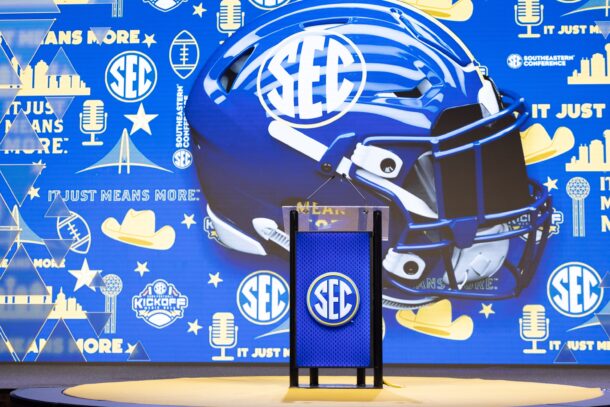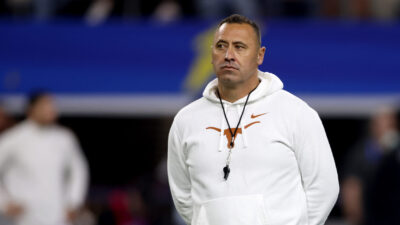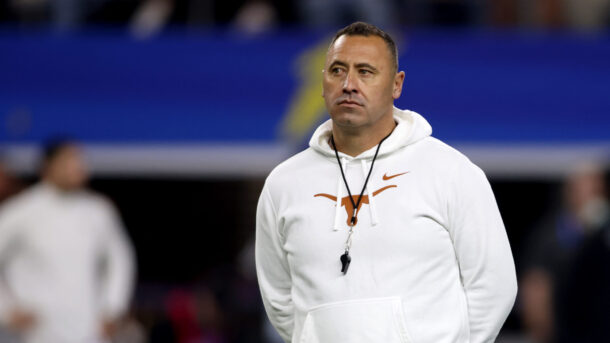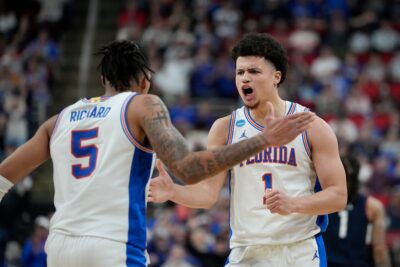Ad Disclosure

How the past 20 Heisman Trophy winners fared in the postseason
By Jim Tomlin
Published:
Quarterback Baker Mayfield received his Heisman Trophy on Dec. 9, accepting the award a week after helping his Oklahoma Sooners reach the College Football Playoff.
When he faces Georgia on Monday in the Rose Bowl, Mayfield will try to lead his team to the CFP final. If Oklahoma gets there he can become the third player in five years to follow a Heisman with a national title, joining Florida State’s Jameis Winston (2013) and Alabama’s Derrick Henry (2015).
But Heisman accolades have not always led to glory in bowl games. In the 20 years since Danny Wuerffel won the big trophy then led Florida to the national title, Heisman winners have gone 11-9 in bowls.
Here’s a look at how the past 20 Heisman winners have fared in the postseason, grouped by how their teams did in bowls:
Won national championship
1997, Charles Woodson, Michigan: The first defensive player to win the award had the Rose Bowl’s lone interception in a 21-16 victory over Washington State, which sealed a split national title for the Wolverines.
2004, Matt Leinart, USC: He was only 18-for-35 in the BCS title game against Oklahoma, but the junior threw for five touchdowns as the Trojans completed a wire-to-wire run at No. 1 by routing the Sooners 55-19 at the Orange Bowl.
2009, Mark Ingram, Alabama: The Crimson Tide’s first Heisman Trophy winner capped a perfect season both personally and for the team. The sophomore ran for 116 yards and two touchdowns as Alabama finished 14-0 with a 37-21 victory over Texas in Pasadena, Calif.
2010, Cam Newton, Auburn: Like Ingram the year before, Newton capped a perfect season with a national championship. He threw for 265 yards and two touchdowns and ran for 64 yards as the Tigers defeated Oregon 22-19 in the BCS title game.

2013, Jameis Winston, Florida State: He capped his redshirt freshman season with not only the Heisman but an unbeaten national championship season for the Seminoles in the final season of the BCS. Winston threw for 237 yards and two touchdowns, including the winning 2-yard score to Kelvin Benjamin with 13 seconds left to beat Auburn 34-31.
https://youtu.be/a8fSWJpGvCA?t=8834
2015, Derrick Henry, Alabama: The Crimson Tide claimed the big prize thanks in large part to Henry, who rushed for 158 yards and three touchdowns against Clemson in a 45-40 victory in Glendale, Ariz. Henry’s 1-yard TD run with 1:07 left sealed it for Alabama.
Won bowl game
1998, Ricky Williams, Texas: The Longhorns defeated Mississippi State 38-11 in the Cotton Bowl to finish ranked 15th. Williams had 203 rushing yards, two touchdowns and one Heisman pose.
1999, Ron Dayne, Wisconsin: Dayne rushed for 200 yards and a touchdown as the Badgers defeated Stanford 17-9 to win the Rose Bowl and finish fourth in the AP poll, their best ranking since 1962.
2002, Carson Palmer, USC: The Trojans topped No. 3 Iowa 38-17 in the Rose Bowl and wound up No. 4 in the final AP Poll. Palmer had 303 yards and a touchdown passing against the Hawkeyes.
2011, Robert Griffin III, Baylor: The final game of his Heisman season was a shootout with the Bears defeating Washington 67-56 in the Alamo Bowl — but RG3, who accounted for two scores, wasn’t the star of the game as teammate Terrance Ganaway rushed for 200 yards and five touchdowns.
2012, Johnny Manziel, Texas A&M: The first redshirt freshman to win the Heisman led the Aggies past Oklahoma 41-13 in the Cotton Bowl, throwing for two touchdowns and scoring twice on the ground while accounting for 516 total yards, still a Cotton Bowl record.
Lost bowl game
2000, Chris Weinke, Florida State: The Seminoles reached the BCS national title game but Oklahoma beat them 13-2 in a game that wasn’t that close as Weinke threw for 274 yards but had three turnovers and, obviously, no touchdowns.
2001, Eric Crouch, Nebraska: The Cornhuskers were a controversial choice for the BCS championship game after losing in the Big 12 title game, then Miami crushed Nebraska 37-14 in the Rose Bowl as Crouch ran for 114 yards but was 5-for-15 for 62 yards passing.
2003, Jason White, Oklahoma: Like Nebraska two years earlier, Oklahoma lost the Big 12 title game but reached the BCS championship game anyway. And also like that Nebraska team, the Sooners lost the title game, this time 21-14 against LSU, as White had a brutal 13-for-37 outing for just 102 yards and two interceptions against Nick Saban’s Tigers.
2005 (vacated), Reggie Bush, USC: His Heisman campaign ended with perhaps the greatest game in college football history, as Vince Young led Texas past USC 41-38 in the final seconds of a classic BCS title game at the Rose Bowl. Bush gained 177 total yards and made one ill-advised decision to pitch the ball while he was stacked up by the Longhorns defense. He later vacated his Heisman and returned it because he had received impermissible benefits.
2006, Troy Smith, Ohio State: Smith threw for 2,542 yards in his senior season, earning top recognition from the Downtown Athletic Club, but had his worst college game at the worst time. He was 4-of-14 for 35 yards and ran 10 times for minus-29 yards as Florida routed OSU 41-14 in the BCS Championship Game.
2007, Tim Tebow, Florida: Oddly, Tebow’s Heisman campaign was the least successful of his four college seasons from a team standpoint. The Gators capped a 9-4 season with a 41-25 loss to Michigan in the Capital One Bowl as Tebow was just 17-of-33 passing for 154 yards and averaged 3.6 yards on 16 carries.
2008, Sam Bradford, Oklahoma: The Sooners reached the BCS national title game for the fourth time in nine years but lost to Florida 24-14 in Miami as Bradford threw for 256 yards and two touchdowns with two interceptions.
2014, Marcus Mariota, Oregon: Another case where the Heisman winner played for the national championship, this time in the inaugural season of the College Football Playoff. Mariota dominated FSU in the semifinal, accounting for 400 total yards and three scores. But the Ducks were overwhelmed in the final against Ohio State. Mariota passed for 333 yards and two touchdowns in the title game but was intercepted once and ran for just 39 yards in the 42-20 loss.
2016, Lamar Jackson, Louisville: The sophomore had probably his worst game of the season as the Cardinals lost 29-9 to LSU in the Citrus Bowl. Jackson had a season-low 33 yards rushing and was just 10-of-27 passing for 153 yards, his second-lowest total of the season.
Longtime newspaper veteran Jim Tomlin is a copy editor and writer with SaturdayDownSouth.com.




